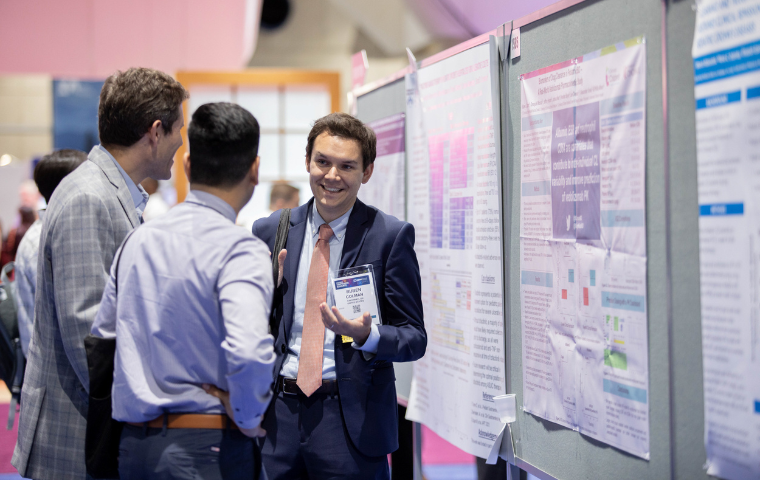Since 2015, DDW® has awarded 20 Basic Science Travel Awards to young researchers each year. This year is no exception.
Reviewers from all four DDW sponsoring societies collaborated to select the 20 award winners, who received $1,000 travel grants to support their attendance at DDW. Applicants were required to be the first or presenting author of a basic science abstract accepted at DDW as an oral or poster presentation. Applicants also were required to be participants in a training program or within three years of completing their training.
This year’s applicants ranged from PhD and MD students to early career researchers. Each submitted a CV/resume and a personal statement summarizing their research aptitude and the impact that attending DDW would have on their research and careers. Reviewers evaluated each applicant’s role in the research and their potential for future contributions to the field.
Congrats to the 2024 Basic Science Travel Awards recipients! Check out each abstract title below and add their poster or lecture presentation to your schedule!
2024 Basic Science Travel Award Recipients
Bifidobacterium Bifidum Enhancement of Intestinal Epithelial Tight Junction Barrier is Mediated by Tlr-2/Tlr-6 Signal Transduction Pathway-Dependent Increase In Toll-Interacting Protein (Tollip) and Occludin Gene Activity
Raz F. Abdulqadir, BS, MSc
Tgfβ-Induced Long Non-Coding Rna In Cholangiocytes (Tilc) Promotes Fibrogenic Gene Expression
Abid Anwar, BS
Breaking the Fibrotic Barrier: Revealing Wnt-Signalling Pathway Pharmacological Targeting and Metabolic Restoration as Innovative Approaches in the Management of Crohn’s Disease
Annalisa Buck, BS, MS
A Novel Isolate Of Streptococcus Salivarius, Agira0003, Disrupts Tight Junctions Ex Vivo in Functional Dyspepsia
Grace L. Burns, PhD
Analysis of the Healthy Human Pancreas Reveals Frequent Neoplastic Lesions With a Distinct Microenvironment
Eileen Carpenter, MD, PhD
Gut-Derived Serotonin: Novel Therapeutic Avenues for Neuropsychiatric Disorders
Majid Davidson, BS ChE, MS
Dietary Lactones Cause Increased Intestinal Proteolytic Activity in Humanized Mouse Model of Irritable Bowel Syndrome Through a Loss of Microbial Β-Gluronidase Activity
Adam Edwinson, PhD
The Beneficial Microbe Lactococcus Lactis Subspecies Cremoris Confers Hepatoprotection via Rewiring of Metabolic Pathways in the Gut and Liver
Camilo Anthony Gallarde Gacasan, BS
Obese Adipose Tissue Extracellular Vesicles Activate Fatty Acid Oxidation to Drive Colonic Stemness
Parsa Haque, M.Pharm.
Dietary Cholesterol Promotes Shifts in Liver Microbiota Community Membership and Drives Hepatic Cd8+ T-Cell Exhaustion in a Mouse Model of Metabolic Dysfunction-Associated Steatotic Liver Disease
Jake Brenner Hermanson, BS
Single Cell Transcriptomics Reveal Mast Cell Heterogeneity in the Human Gut in Health And IBS
Hind Hussein, PhD
Eosinophils as an Anti-Fibrotic Cell Type In A Dss Colitis Rag-/- and an in Vitro Co-Culture Model
Inge Jacobs, MBE
Microbiome Damage Due to Interaction Between Western Diet and Antibiotics is Most Effectively Countered by Dietary Intervention
Megan S. Kennedy, PhD
Distinct Matrisome Expression Patterns in Different Pdac Metastatic Sites
Lorena Llontop, MS
Spatially Resolved Insights Into Fistulating Crohn’s Disease Pathogenesis: Unveiling Molecular Heterogeneity
Colleen McGregor, BSc, MBBS
Ppara Variant V227A Reduces Plasma Triglycerides Through Lpl Induction
Alexander Nguyen, MD, PhD
Binge Alcohol-Induced Gut Leakiness, Liver Steatosis And Neurodegeneration Via Cyp2E1-Dependent Oxidative Stress and Acrolein Production Through the Gut-Liver-Brain Axis
Wiramon Rungratanawanich, PhD
Microbiota Driven Intestinal Inflammation Averted By Il10 Producing Kruppel-Like Factor 2 Cd4+ T Cells
Abigail Russi, MD, PhD
Two Different Roles of the Chromatin Remodeling Component Arid1A in Neoplastic Transformation of Gastric Mucosa
Yoonkyung Won, PhD
Metabolomics Combined With Single-Cell Sequencing Reveal the Metabolic Reprogramming in Intestinal Fibrosis
Yao Zhang, MB


